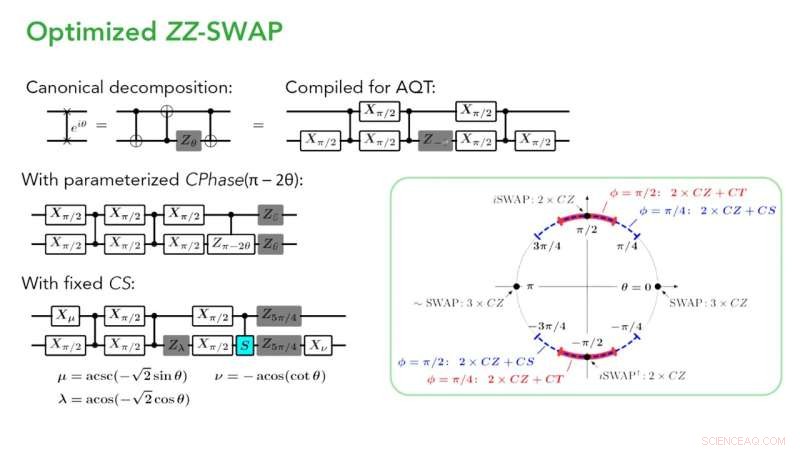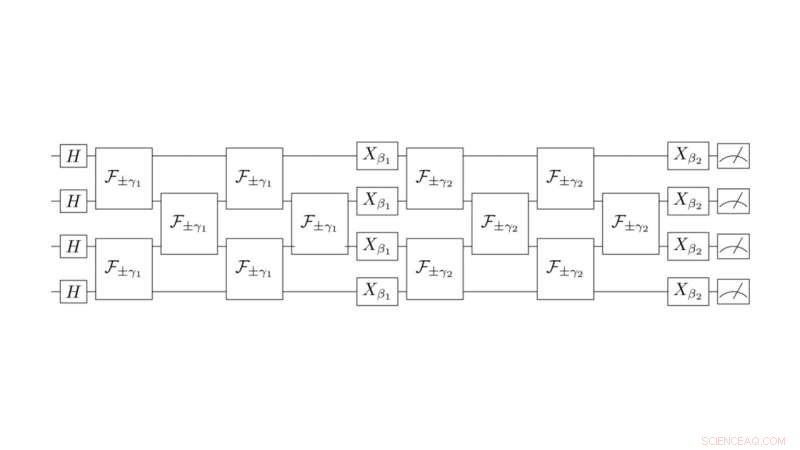
Schéma complet des réseaux SWAP optimisés par logiciel pour les portails de l'AQT. Crédit :Rich Rines/Super.tech
Un partenariat de recherche au Advanced Quantum Testbed (AQT) du Lawrence Berkeley National Laboratory (Berkeley Lab) et à Super.tech, basé à Chicago (acquis par ColdQuanta en mai 2022), a démontré comment optimiser l'exécution du protocole de réseau ZZ SWAP, important pour l'informatique quantique. L'équipe a également introduit une nouvelle technique d'atténuation des erreurs quantiques qui améliorera la mise en œuvre du protocole réseau dans les processeurs quantiques. Les données expérimentales ont été publiées en juillet dans Physical Review Research , ajoutant plus de voies à court terme pour mettre en œuvre des algorithmes quantiques utilisant l'informatique quantique basée sur les portes.
Un compilateur intelligent pour le matériel quantique supraconducteur
Les processeurs quantiques avec des architectures à deux ou trois dimensions ont une connectivité qubit limitée où chaque qubit interagit avec seulement un nombre limité d'autres qubits. De plus, les informations de chaque qubit ne peuvent exister que si longtemps avant que le bruit et les erreurs ne provoquent une décohérence, limitant la durée d'exécution et la fidélité des algorithmes quantiques. Par conséquent, lors de la conception et de l'exécution d'un circuit quantique, les chercheurs doivent optimiser la traduction du circuit composé de portes abstraites (logiques) en instructions physiques basées sur les portes matérielles natives disponibles dans un processeur quantique donné. Des décompositions de circuits efficaces minimisent le temps de fonctionnement car elles tiennent compte du nombre de portes et d'opérations supportées nativement par le matériel pour effectuer les opérations logiques souhaitées.
Les portes SWAP, qui échangent des informations entre les qubits, sont souvent introduites dans les circuits quantiques pour faciliter les interactions entre les informations dans des qubits non adjacents. Si un dispositif quantique n'autorise que des portes entre des qubits adjacents, des permutations sont utilisées pour déplacer des informations d'un qubit à un autre qubit non adjacent.
Dans le matériel quantique à échelle intermédiaire bruyant (NISQ), l'introduction de portes d'échange peut nécessiter une surcharge expérimentale importante. La porte d'échange doit souvent être décomposée en portes natives, telles que des portes NON contrôlées. Par conséquent, lors de la conception de circuits quantiques avec une connectivité qubit limitée, il est important d'utiliser un compilateur intelligent qui peut rechercher, décomposer et annuler des portes quantiques redondantes pour améliorer la durée d'exécution d'un algorithme ou d'une application quantique.

Schéma des réseaux SWAP pour QAOA sur quatre qubits. Crédit :Akel Hashim/Berkeley Lab
Le partenariat de recherche a utilisé le logiciel SuperstaQ de Super.tech permettant aux scientifiques d'adapter finement leurs applications et d'automatiser les compilations de circuits pour le matériel supraconducteur d'AQT, en particulier pour une porte S contrôlée haute fidélité native, qui n'est pas disponible sur la plupart des systèmes matériels. Cette approche de compilation intelligente avec quatre qubits transmon permet aux réseaux SWAP d'être décomposés plus efficacement que les méthodes de décomposition standard.
A network of ZZ SWAP gates requires only minimal linear connectivity between qubits without additional couplings, so it offers practical advantages for the efficient execution of quantum algorithms such as the Quantum Approximate Optimization Algorithm (QAOA). QAOA approximates solutions to combinatorial optimization problems—finding the optimal answer by giving a set of criteria. The Maximum-Cut problem, which can be used to arrange hubs on a transport grid system, is an example of a famous combinatorial optimization problem that can be potentially solved faster with QAOA using quantum circuits.
"One of the toughest challenges in quantum computing is to perform discrete logic operations. Because our control signals are analog and continuous, they're always imperfect. As we build more complex quantum circuits, the software infrastructure that optimally compiles gates tailored for AQT's hardware helps us achieve higher operational fidelity," Akel Hashim, the lead AQT researcher on the experiment and a graduate student at the University of California, Berkeley.
"A unique feature of quantum computing is that it enables partial logic gates. This feature has no parallel in traditional boolean logic—for example, your laptop computer can't execute 50% of an AND gate. AQT's ability to calibrate these partial controlled-S quantum gates opened the door for us to develop a wider array of novel optimizations to squeeze the most out of the hardware," said Rich Rines, formerly of Super.tech and currently a software engineer at ColdQuanta.
"A key software engineering challenge for this experiment was collaborating remotely, so we iteratively developed quantum circuit optimizations informed by the custom gates AQT's team calibrated. We optimized end-to-end by figuring out how to serialize these pulses while considering the hardware. We also figured out how to integrate open-source quantum software packages with our compiler, ensuring that our optimizations don't re-invent the wheel," said Victory Omole, formerly at Super.tech and software engineer at ColdQuanta.

Akel Hashim, lead AQT researcher on the experiment. Credit:Akel Hashim/Berkeley Lab
As part of the experiment, the team also introduced a novel technique called Equivalent Circuit Averaging (ECA), which randomized the various parameters of the SWAP networks to generate many logically equivalent circuits. ECA randomizes the decomposition of quantum circuits, mitigating the impact of systematic coherent errors—one of the most severe errors in quantum computers and error mitigation at AQT.
"I proposed a way to merge my previous experimental work in randomized compiling with Quantum Benchmark (acquired by Keysight) using Super.tech's smart compiler to study a new way to reduce the impact of crosstalk errors," said Hashim. "I would not have had the insight to come up with this idea had I not worked with other researchers as part of AQT's user program. As someone who's going to enter the workforce, networking is critical to building a core base of people I know in the field who are experts in various areas, to whom I can pitch research ideas as well."
These experimental optimizations resulted in an improvement of up to 88% in the performance accuracy of QAOA. Researchers are looking to continue to explore and refine the methods in this work and apply them to other applications.
Supporting industry growth with an open-access research lab
AQT operates a state-of-the-art open experimental testbed based on superconducting circuits and is funded by the United States Department of Energy Office of Science Advanced Scientific Computing Research (ASCR) program. Technologies developed elsewhere can be deployed and field-tested at AQT, providing deep access to the full quantum computing stack at no additional cost.
Since the inauguration of its user program in 2020, AQT provided Super.tech, one of several industry users, with low-level access to the hardware to test their ideas. Few cloud-based quantum platforms offer this type of full access to the entire quantum computing stack and real-time feedback from the hardware experts at no cost. Super.tech collaborated with AQT's expert experimental team to learn ways to improve performance on this type of hardware.
"By revealing the inner controls of quantum hardware, AQT's collaborative approach with users drives innovation throughout the quantum computing stack. We look forward to continuing our research collaboration with AQT, and we will continue to share these results with the scientific community by publishing our learnings," said Pranav Gokhale, VP of Quantum Software at ColdQuanta and Super.tech former CEO and co-founder.
AQT at Berkeley Lab continues to grow as a cutting-edge hub for quantum information research and development by bringing together expertise and users, including early-stage startups, such as Super.tech, who now continue in their growth journey as part of ColdQuanta. Breakthrough in quantum universal gate sets:A high-fidelity iToffoli gate